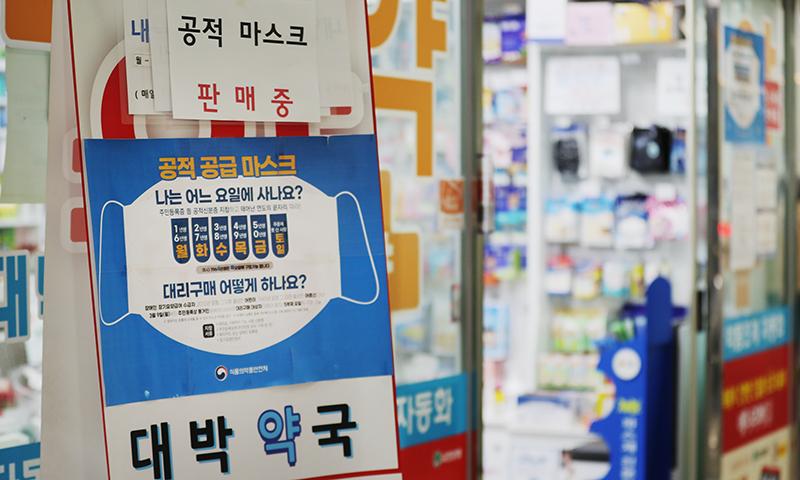
The novel coronavirus disease (COVID-19) has made the world far more aware of the importance of wearing masks. Korea began rationing masks in March so that each person could buy two masks a week. (Kim Sunjoo)
By Lee Kyoung Mi and Lee Jihae
Seoul | April 16, 2020
Nam Kyoung-mo, an office worker in Seoul, drops by a pharmacy on April 8. He can buy two masks that day (Wednesday) because he was born in 1983, with the number of masks one can buy determined by the final number of his or her birth year. He expected to wait in a long line in front of the pharmacy, but because hardly anyone was there, he got his masks right away.
Most people on Korea's streets wear masks amid the global outbreak of the novel coronavirus disease (COVID-19). Masks are now a necessity not only when commuting to and from work, but also for shopping and going out.
Washing hands, wearing masks and social distancing are emphasized as means of preventing COVID-19, experts say, adding that masks are highly effective in preventing the coronavirus, which can be transmitted through saliva droplets of the infected.
While masks have caught on in the cultures of Asian countries such as Korea, China and Japan, many in the West such as the U.S. and Europe did not wear them. With the number of confirmed cases and fatalities surging due to COVID-19, however, the Western perception of masks has begun to change as more people in the West now wear them. The Czech Republic, Austria, India and the German city of Jena now require wearing masks in public.
Korea does not mandate wearing masks outside of one's home, but the practice is the norm given public acknowledgement of the need to stem COVID-19.
Now Koreans find it easy to purchase masks as shown in the case of the Seoul office worker, yet supply has not always been smooth. In the early stage of the outbreak, a surge of fear and anxiety disallowed supply to keep up with demand and led to a "mask crisis."
To resolve this problem, the government laid out a policy to stabilize the mask supply and began rationing masks from March 9. Under this system, each person can purchase two masks on a certain weekday depending on his or her year of birth. Those whose birth year ends with either 1 or 6 can purchase masks on Monday, those with 2 or 7 on Tuesday, 3 or 8 on Wednesdays, 4 or 9 on Thursdays and 5 or 0 on Fridays. Saturday and Sunday are open to those who failed to buy their quota during the weekdays.
No one can purchase more than two masks per week. Foreign residents can purchase the masks if they have national health insurance and present their insurance cards and alien registration certificates.
The early days of this rationing system saw a supply shortage, with long lines outside of pharmacies leading to a host of problems. To secure a steady mask supply, the government prohibited the hoarding and sending of masks abroad, and supported the expansion of mask production.
People also participated in a campaign of not buying masks so that those who needed them more could purchase them. Both public and civic efforts were started to this end, with some involving the making of cotton masks and donating them. All these efforts swiftly stabilized mask supply and demand, with Korea's strategy for this considered a benchmark by foreign media.
The rationing system began about a month ago, and long lines for masks are now hard to find. Signs in front of pharmacies often say "selling publicly rationed masks" instead of saying they are sold out, leading to public consensus that mask supply and demand are stable.
According to the Ministry of Food and Drug Safety, the national supply of masks was 9.71 million as of April 15, more than four times the 2.4 million available on Feb. 27, when the government started supplying publicly made masks before the launch of the rationing system.
As of April 15, the cumulative number of confirmed cases in Korea was 10,591 and that of daily cases had stayed under 40 for a week. Though the spread of COVID-19 is declining, it remains premature to relax restrictions as a vaccine has yet to be developed and the number of cases imported from abroad and those of re-infection. Experts warn against lowering of the public's guard and urge continued observance of basic preventive measures such as wearing masks and frequently washing hands.
km137426@korea.kr